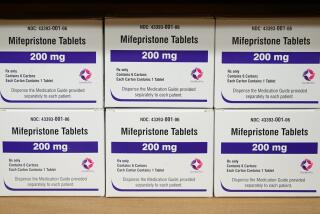3 Parkinson’s Studies Find Benefits in Fetal Tissue Use : Medicine: Patients’ mobility, quality of life improve. Doctors hail controversial technique as a ‘major step.’
In three separate studies released today, researchers report the most convincing evidence yet that the controversial technique of implanting tissues from aborted fetuses into the brains of Parkinson’s disease patients can produce significant improvements in mobility and quality of life.
The reports, which appear in the New England Journal of Medicine, say that 12 of 13 patients who received the transplants in the United States and Sweden became more independent in their daily lives and were able to resume many activities and reduce their use of anti-Parkinson drugs, according to the three teams of investigators. The 13th patient died shortly after surgery of complications of Parkinson’s disease.
In a separate editorial, the editors of the New England Journal of Medicine called upon the incoming Clinton Administration to lift the federal moratorium on use of fetal tissues. President-elect Bill Clinton has promised to do so, opening the way for many other researchers to undertake what Dr. Curt R. Freed, a neurologist at the University of Colorado Health Sciences Center in Denver, calls “a new dimension in treatment of Parkinson’s.”
The results of the new studies “do not yet herald a ‘cure’ for this insidious neurodegenerative disease of aging, but they’re proving to be an exciting and major step in furthering research to develop treatments for Parkinson’s disease” and related brain disorders, such as Alzheimer’s and Huntington’s diseases, said Dr. J. William Langston, a neurologist at the California Parkinson’s Foundation in San Jose.
But the experts cautioned that much more research needs to be undertaken before the grafts can be performed on large numbers of patients. Although the new results are cause for optimism, researchers do not yet know the optimal amount of fetal tissue that should be used, the ideal target site in the brain, how long the benefits will persist and, perhaps most important, which patients are most likely to benefit from the procedure, according to Dr. Stanley Fahn, a neurologist at the Columbia University College of Physicians and Surgeons in New York City.
Parkinson’s disease, whose cause is unknown, affects up to 1 million Americans, most over the age of 55. It is characterized by tremors and rigidity in the limbs and loss of muscle control. As many as a third of patients also develop dementia.
Parkinson’s disease results from the death of brain cells that produce a neurotransmitter called dopamine, which plays a key role in transmitting commands to the muscle control centers. The disorder is treated with a drug called L-dopa, which alleviates symptoms by producing dopamine in the brain. But many patients do not respond to L-dopa and most eventually become resistant to its effects.
In the last five years, researchers have treated more than 200 patients with transplants of dopamine-producing cells from their own adrenal glands, but those experiments have had mixed results.
Animal studies have shown that fetal brain cells are much more effective than adrenal cells, and the new results support that finding. The cells are typically injected into the caudate or putamen of the brain, sites where dopamine is produced and used.
At least 20 patients around the world have received fetal tissue grafts, but researchers have typically reported results only for individual patients at scientific meetings. Today’s reports mark the first time that results from a large proportion of the patients have been collected.
Perhaps the most unusual and dramatic report was from Langston and his colleagues at University Hospital in Lund, Sweden. They performed the surgery on two severely disabled patients who had an unusual form of Parkinson’s caused by accidental exposure to a chemical called MPTP, which destroys the same areas of the brain that die naturally in Parkinson’s.
MPTP is a contaminant of a synthetic form of heroin that was widely used in the early 1980s. Researchers use the chemical to produce Parkinsonian symptoms in animal studies of fetal implants, and Langston’s results provide a crucial link between the animal experiments and treatment of the disorder in humans.
The Lund neurosurgeons implanted brain tissues from eight aborted fetuses in two MPTP victims who were almost completely incapacitated. “Both had a more severe dopamine deficiency that most patients with Parkinson’s have when they die,” Langston said. Both patients, who were formerly in the care of their families, are now living independently.
Freed and his colleagues reported results with seven patients, although they have now operated on 12, putting tissue from one fetus in each. Five of the seven showed strong improvement while the remaining two showed moderate improvement. The results are like turning back the clock on the disease five or 10 years, Freed said.
The first patient Freed operated on, 52-year-old Don Nelson of Denver, has had the graft for 46 months and continues to show gains. “As we were installing computer equipment 40 months after the transplant to monitor him, it was obvious that his ability to walk in the morning was better than it was 15 months after the surgery,” Freed said.
Sophisticated imaging techniques have also shown that Nelson’s brain continues to increase its consumption of chemicals that are converted to dopamine, a sign that the cells are functioning correctly. Freed’s other patients also continue to improve.
Finally, Dr. D. Eugene Redmond Jr., a neurologist at Yale University, and his colleagues reported their results with four patients who also received tissue from one fetus apiece. One died of causes unrelated to the surgery, but the other three have shown consistent improvement in movement.






